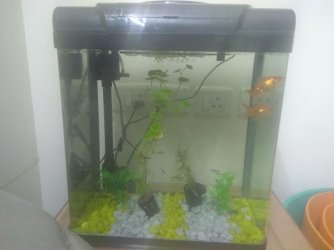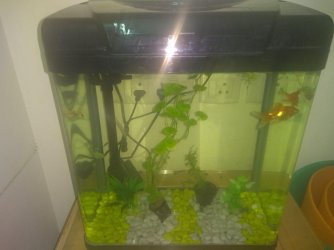gopikrish81
New Member
Hi,
To start with - I learnt about nitrogen cycle and establishing tank only after losing my first fish. Even the Aquarium seller did not mention about it
I bought the tank (attached picture) on 31st Jan and along with it 2 artificial plant, gravel. Along with the tank came water pump with filter and sponge, siphon cleaner tube.
2 fantail goldfish (2.5 inch), 2 orange guppy, 2 black guppy, 2 blackskirt tetra(glo fish yellow fluorescent), 2 neon tetras.
On 2nd day one of the neon died and immediately I researched online to find that neon's are schooling group and do best with family of 6 or more. So I purchased 7 more neon's and added the same day!
Next day another neon died and on 4th day a black guppy and on 5th day another neon died. Purchased 2 more guppies (orange and yellow tail) on 6th day (friday) along with 2 live plants(hoping for more hiding place and also read that live plants can aid in faster nitrogen cycle process), and on 8th day the recently purchased yellow tail guppy also died (ie yesterday Sunday). So 5 died out of total 19 and 14 remain as of now.
I feed only 2-3 pinches morning and evening and tank is not under any sunlight and it is in my living room which is not bright ( I can say quite dark on day time and lights on only from 6PM - 11 PM) and with filters running 24x7. Also the water is quite warm since we live in tropical climate.
Today I purchased API Fresh Water Master Test Kit and this is what I am planning to do -
1) So my ask for experts is if my above plan looks good? I am not sure how to check if my tank got established fully.
2) So my assumption is if water test return 0 ppm of ammonia, nitrate and nitrites then tank must have got full nitrogen cycle, correct?
3) Also, can I rinse the filter lightly once with little of my existing tank water in a bowl (maybe in between around 20th day?) since I am afraid it may wash off if any benefetial bacterias forming colonies. But today I just removed 2 or 3 dirt particles manually from sponge pores. But not seeing any major dirt in sponge except the color of white sponge has turned little grey in some parts.
So above 3 are my questions to experts and highly appreciate your suggestion on these 3 points or you also correct me if my plan is entirely wrong!
Thanks in advance!
PS: Picture with tank1(with flashlight on), tank2(with flashlight off) so there is a difference in color appearence, but to naked eye water looks clear and white only.
To start with - I learnt about nitrogen cycle and establishing tank only after losing my first fish. Even the Aquarium seller did not mention about it
I bought the tank (attached picture) on 31st Jan and along with it 2 artificial plant, gravel. Along with the tank came water pump with filter and sponge, siphon cleaner tube.
2 fantail goldfish (2.5 inch), 2 orange guppy, 2 black guppy, 2 blackskirt tetra(glo fish yellow fluorescent), 2 neon tetras.
On 2nd day one of the neon died and immediately I researched online to find that neon's are schooling group and do best with family of 6 or more. So I purchased 7 more neon's and added the same day!
Next day another neon died and on 4th day a black guppy and on 5th day another neon died. Purchased 2 more guppies (orange and yellow tail) on 6th day (friday) along with 2 live plants(hoping for more hiding place and also read that live plants can aid in faster nitrogen cycle process), and on 8th day the recently purchased yellow tail guppy also died (ie yesterday Sunday). So 5 died out of total 19 and 14 remain as of now.
I feed only 2-3 pinches morning and evening and tank is not under any sunlight and it is in my living room which is not bright ( I can say quite dark on day time and lights on only from 6PM - 11 PM) and with filters running 24x7. Also the water is quite warm since we live in tropical climate.
Today I purchased API Fresh Water Master Test Kit and this is what I am planning to do -
- Whatever fish maybe remaining, continue to run the tank with filter on always and hoping that tank gets established with benefetial bacteria by 42 days(6 weeks)
- Will be getting the test kit by this saturday and perform water test for ammonia, nitrates and nitrites once in 7 days. If any high ppm is noticed perform 25% water change immediately or else perform 25% water change on 20th day and another 25% water change on 40th day, before finally performing water test on 42nd day and if all is fine(with 0 ppm) then only purchase additional fish (to start with 4 and gradually increase another to another 4 the following week)
1) So my ask for experts is if my above plan looks good? I am not sure how to check if my tank got established fully.
2) So my assumption is if water test return 0 ppm of ammonia, nitrate and nitrites then tank must have got full nitrogen cycle, correct?
3) Also, can I rinse the filter lightly once with little of my existing tank water in a bowl (maybe in between around 20th day?) since I am afraid it may wash off if any benefetial bacterias forming colonies. But today I just removed 2 or 3 dirt particles manually from sponge pores. But not seeing any major dirt in sponge except the color of white sponge has turned little grey in some parts.
So above 3 are my questions to experts and highly appreciate your suggestion on these 3 points or you also correct me if my plan is entirely wrong!
Thanks in advance!
PS: Picture with tank1(with flashlight on), tank2(with flashlight off) so there is a difference in color appearence, but to naked eye water looks clear and white only.



